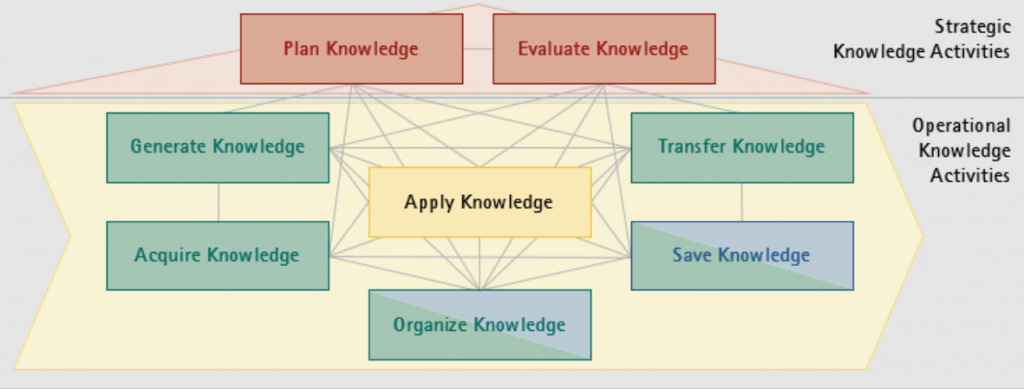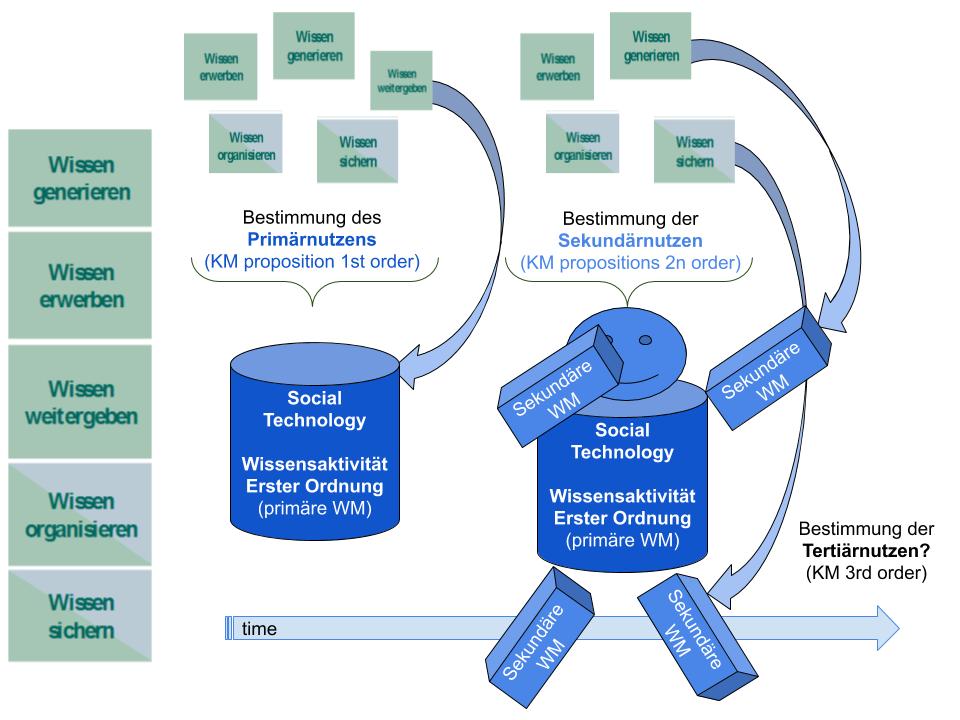by Sebastian Dennerlein, Stefan Schweiger & Robert Gutounig

Figure 1: Knowledge activities (based on Probst et al. 2002)
The model of knowledge activities has been an integral part of Wissensmanagement Forum`s knowledge management handbook from 2007 (Wissensmanagement Forum 2007; Figure 1). In 2016, we re-examined the model of knowledge activities (
https://www.wm-forum.org/knowledge-activities-revisited/) in order to address necessary redefinitions, extensions and clarifications. Since that time, however, the evolution of the social media landscape has again challenged the concept of knowledge activities due to the development of underlying technologies and services. On the one hand, social technologies are more comprehensive in their functionality (e.g. G Suite from Google offering Google Drive, Docs, Forms & Hangouts) and, on the other hand, they are much more integrated nowadays and offer ready-made integrations with one-click (e.g. Slack with an abundance of integrations ranging from Google Drive over Trello to Twitter).
This situation led to increased complexity in the understanding, application and evaluation of social media for knowledge management as these new technologies cover all knowledge activities ‘on first sight”. Therefore, there is a need for a more sophisticated approach to analysing social technologies for selecting technologies as well as evaluation their effectivity. This implies that core as well as peripheral functionalities of social media and the elements of social media suites need to be disassembled to be able to leverage them for the support of knowledge management processes.
We propose a model that leverages the knowledge activities for understanding the usefulness of a social technology for different stakeholders, namely the addressed knowledge workers. For each of these stakeholders, the model differentiates the degree of usefulness on several orders of knowledge activities:
while the first order describes the primary knowledge management value proposition in terms of a respective knowledge activity for a certain user group, the second order describes the second important knowledge management value proposition in terms of another knowledge activity and so on.
For example when leveraging a social software tool, the knowledge worker might apply a particular tool for a
primary use (e.g. Google Docs
first order: save knowledge), while having other functionalities available at the same time as
secondary use (e.g.
second order: o
rganize knowledge). This could also extend to third or fourth order usefulness (e.g.
third order: knowledge transfer, or f
ourth order: generate knowledge). The person who implements tools that allow for different knowledge activities may have different
stakeholders or
goals in mind, or different stages of the
development of software.

Figure 2: Social Technologies Knowledge Activities Cheatsheet
For this reason, the selected tool should always focus on the first knowledge management value proposition to make sure to serve this use with the core functionality and not only peripherally. Slack, Riot and WhatsApp represent communication tools and promote knowledge transfer with their core functionality. Yet, they differ with respect to their additional peripheral functionality. So, it is important to understand the diverse stakeholders of social software in terms of their second level knowledge management value proposition to only consider tools that serve these knowledge activities on the higher orders.
Since social software (suites) incorporate an increasing set of functionalities via internal and external extension, the orders of knowledge management value propositions might also be differentiated regarding the underlying technological choices. Functionalities provided by internal extensions such as tools of a suite or software plugins are closer to the main value proposition of the tool, than external extensions of functionality by API integrations of other services. This becomes apparent when looking at social software suites like G Suite: while Docs, Forms, spreadsheet etc. could represent second order knowledge management value propositions with respect to the first order value proposition of google drive and from within the software environment, a slack integration could represent a third order knowledge management value propositions from the outside.
In addition to the stepwise approach to the analysis of knowledge activities, we identified further knowledge activities that should be taken into account when understanding knowledge management processes as well as social technologies:
- knowledge protection,
- knowledge validation and
- knowledge maturing.
Knowledge protection helps to keep track of critical knowledge that needs to be protected for the success of the organisation, not only targeting the protection of data. Knowledge validation aims at validation of acquired or newly generated knowledge to prevent building upon wrong knowledge or preventing false information (e.g. fake news). Finally, knowledge maturing differentiates from knowledge generation by developing existing knowledge and formalizing it.



